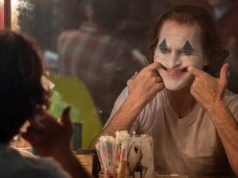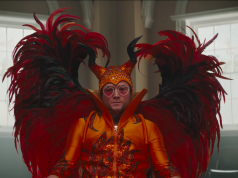All that separates “Walk the Line,” the Johnny Cash biopic, from “Ray,” the Ray Charles biopic, is that the subjects were of different races and played different styles of music. Both films start in the poverty-stricken South with the death of the protagonist’s brother, an event which haunts him forever. Both films focus on the heroes succumbing to the temptations of fame, particularly drugs and adultery, and both films have scenes where the singers’ personal lives work their way into their music. Eventually, both men overcome their obstacles to become preeminent artisans in their respective genres.
The question with “Walk the Line,” as with “Ray,” is how much you already admire the main character. “Ray” made me appreciate a musician I had previously paid little attention to; “Walk the Line” does nothing to increase or diminish my esteem for Johnny Cash, which was already considerable. Someone who’s never given Cash a second thought probably would not give him a third thought after watching the movie.
That said, it’s a pretty good biopic for those of us who already like the guy. Joaquin Phoenix, as has become the trend these days, doesn’t impersonate Cash so much as he channels him, from his distinctive way of holding a guitar to his iconic singing voice. (Phoenix does his own singing, which is impressive by itself.) Seeing Cash’s life (or at least the years between 1950 and 1968) reenacted can be thrilling for fans. Look, there’s Jerry Lee Lewis! Hey, it’s Elvis, introducing Johnny to recreational pharmaceuticals!
And then there’s June Carter. The film, written by Gill Dennis and James Mangold and directed by Mangold (“Girl, Interrupted”), frames its story around Johnny’s lifelong love for June (Reese Witherspoon). She grew up in a show-business family and is a consummate professional — quite the opposite of Johnny, who comes by his fame after years of shiftlessness and does not adjust to it well. She and Johnny are married to other people while touring the country with a group of musicians, and while adultery is fine for him (his wife, stuck at home, goes through the usual biopic histrionics about how he loves his music more than he loves her), June is not that kind of girl.
Witherspoon is able to give June just enough depth to make her a viable character, even outside the lens of Johnny’s affection for her. (A scene where a stranger confronts her over her divorce is especially telling.) I noticed that when June is onstage, she ratchets up her Southern twang a couple notches, thus increasing her cachet as a down-home gal the audience can relate to. Whether the real June Carter did this, I don’t know, but it’s a nice touch either way.
Oddly, while Johnny’s struggles occupy the bulk of the film, not much attention is paid to what he’s actually thinking. We know he’s tormented by the death of his more-favored brother, that his father (Robert Patrick) wishes Johnny had died instead, that he’s addicted to pills through much of the 1960s. But his inner demons are not demonstrated so much as implied. If his addiction weren’t a fact of history, it would seem like a perfunctory, obligatory movie subplot. (“Well, of COURSE the famous musician is a drug addict. What else?”)
His love for June is more thoroughly examined, though, and it ties in directly with his other love, music. He has loved one almost as long as the other. He listened to June on the radio when they were both children, and as an adult, his songs reflect his relationship with her. June famously wrote “Ring of Fire” about her burning, painful love for Johnny, but Johnny sang it with a cowboy stoicism that barely hid its deeper meaning. To Johnny, June and music are inseparable. When he says, “I want to tour with you again,” he means it literally — but he also means he wants to spend more time with her.
Phoenix and Witherspoon’s performances are the film’s greatest strengths, accurate, honest and affecting. But there’s the music, too, that distinctive, locomotive style that Cash played so well and that Phoenix imitates with uncanny precision. It feels plaintive and emotional, the simple expression of a man who has a few things on his mind that he’d like to share. I don’t know if non-Cash fans will be converted, but people already in his camp will find that it walks the line quite nicely.
B (2 hrs., 16 min.; )





